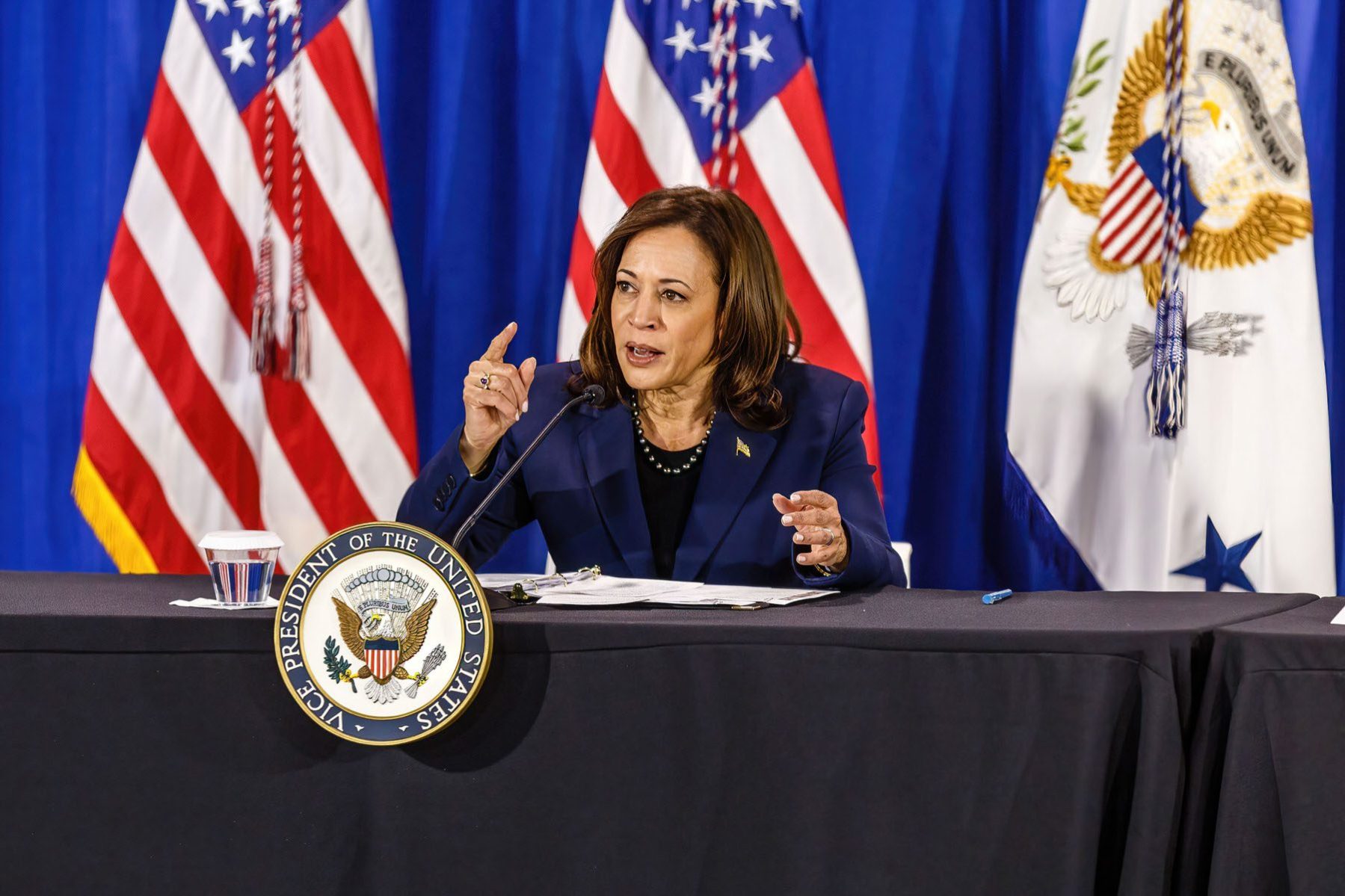Your trusted source for contextualizing abortion news in Iowa and beyond. Subscribe to our daily newsletter.
DES MOINES, Iowa — Vice President Kamala Harris’ Thursday trip to Iowa to discuss abortion rights was so last-minute that Ruth Ann Gaines, a longtime Democratic state representative, got word about it only a few days ago.
On Thursday, Gaines rushed to join other local leaders at the reproductive rights roundtable from the state Capitol, where the Republican-led legislature was in the midst of passing a bill that would prohibit transgender students from using bathrooms or locker rooms that align with their gender identity.
Gaines, one of the few Black legislators in the state, said the proposed bills moving through the statehouse that target gender identity have been nonstop this legislative session. She’s worried about them and also concerned about future abortion restrictions in the state, where the procedure is still mostly legal — for now. It’s part of why Gaines is so grateful the vice president came to Iowa at all.
“We are hurting here in Iowa,” Gaines told The 19th after the event. “The bills that are being passed and being proposed to be passed are setting us back years and years. … I think she came to encourage us as Iowans to keep the faith.”
At the roundtable at Grand View University, a small school near downtown Des Moines, Harris met with a handful of Iowa legislators, advocates and health care providers to discuss abortion access in the state and the nation. She highlighted a pending court case out of Texas, where a judge’s potential ruling could take mifepristone, a key abortion medication, off the market.
“If politicians can start using the court to undo doctors’ decisions, imagine where that can lead,” the vice president said to the roundtable while reporters briefly watched from the back of the room. Harris has traveled the country in recent months and been the most prominent face of the administration’s response to abortion restrictions.
A formerly purple state that voted for Barack Obama twice, Iowa is now ruby red, with Republicans dominating its statewide offices and congressional delegation.
“I love the fact that she has, by her presence, not given up on the state of Iowa,” said Connie Ryan, executive director for the Interfaith Alliance of Iowa and another participant in the roundtable. “People who care deeply about these issues — civil rights issues, access to reproductive health care, LGBTQ rights — we believe strongly that we’re going to find a path forward so that people’s rights are protected.”
National Democrats recently agreed to dislodge Iowa from its roughly five-decade perch as the first state in the country to weigh in on who should be president. But the state still remains the center of American politics, at least for Republicans, who plan to host their early presidential caucus here next year.
Already, several declared and potential Republican presidential hopefuls have stopped by Iowa in recent weeks. Harris’ visit to Iowa comes on the heels of former President Donald Trump’s first stop in the state since declaring his intention for a third presidential bid. Former Vice President Mike Pence is scheduled to be in Iowa on Saturday, one of several stops he’s made recently. Former South Carolina Gov. Nikki Haley, who has announced a run, and Florida Gov. Ron DeSantis and Sen. Tim Scott of South Carolina, who have not, have all been to Iowa recently.
Iowa Democrats don’t want the national party to cede the state to Republicans.
“All national Democrats need to be listening to the voices from those of us who live in the heartland, who live in more rural or Republican-leaning states at the moment, because until our party is taking those voices seriously, we are going to really struggle to win these states back,” said Zach Wahls, the Democratic Senate minority leader who was part of the roundtable and spoke with The 19th after the event.
The press was able to listen to just a small portion of Harris’ discussion with leaders before they were asked to leave the room. But some of the leaders who stayed with Harris described to The 19th how the vice president focused on listening to their concerns after the room emptied out. Several also described a moment where the vice president shared a map of the country showing the different abortion policies in place.
“She was inspiring us, to say that this is a movement to retain our rights to abortion, and historically, good policy, good bills have come from movements,” Gaines said. “… It was very much a rallying kind of speech at the end, for all of us, to give us hope and encouragement.”
Pete McRoberts, policy director of the ACLU of Iowa and another roundtable attendee, said Harris’ message resonated with him. He is closely tracking efforts by Republican lawmakers to pass an anti-abortion constitutional amendment that could go before Iowa voters.
“It was very, very timely and helpful for her to tell Iowans that we’re not alone,” he said. “… This is a tough spot, but we’re not alone. And we may be in a difficult patch for a couple years with respect to reproductive rights, but it’s not forever. That’s my takeaway. She wanted to give people here a little bit of a shot in the arm during a difficult time.”
In addition to the case on mifepristone, Harris also discussed the ongoing effects of a Supreme Court ruling last year that overturned Roe v. Wade, which previously guaranteed federal abortion rights. She also criticized Iowa Attorney General Brenna Bird for joining other Republican attorneys general in trying to stop major pharmacies from offering medication abortions.
“At the core of these issues is a foundational issue for our country,” Harris said. “And it is the principle that we are founded on which says that we each are entitled to freedom and liberty in its most basic manifestation. And is this not about freedom and liberty — the ability to make these decisions about one’s own life?”
Harris, who said Iowa “is on the front line” in the national fight for reproductive rights, comes to the state on the precipice of new abortion restrictions here. Last year, the state Supreme Court overturned a 2018 ruling that abortion was protected under the state constitution. That court is scheduled to hear oral arguments next month on a 2018 Iowa law that would ban most abortion after about six weeks of pregnancy, which is currently on hold.
“It’s really important that people who live in states where abortion rights are not immediately under threat understand that there are lots of places where the end of Roe isn’t a hypothetical,” Wahls said. “It’s a clear and present danger in Iowa.”






